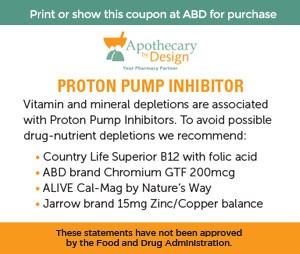Proton Pump Inhibitors (PPIs) are a class of over the counter (OTC) and prescription medications commonly used for heartburn, ulcers, erosive esophagitis, gastro-esophageal reflux disease (GERD) and Zollinger-Ellison syndrome.
The generic names of the medications all end in –prazole, and include: omeprazole (Prilosec, Zegarid), lansoprazole (Prevacid), esomeprazole (Nexium), rabeprazole (Aciphex), pantoprazole (Protonix).

Mechanism of Action:
Specialized cells in the stomach have an enzyme which splits water (H2O) into ions, protons (H+) and hydroxide (OH–), and then pumps the protons out; this is an essential step in the making of stomach acid (HCl). Under normal conditions, this acid creates a highly acidic environment in the presence of food to enhance digestion and absorption of nutrients. PPIs decrease the production of stomach acid by stopping the proton pump that creates it, thereby decrease the acidity of the stomach. This may impact the absorption of many minerals, and some vitamins. These medications have very similar actions across the class, so the drug-nutrient depletions do not vary between them with any significance.
The following nutrients may be depleted when these medications are used for more than one year:
| Vitamin/ Nutrient | Mechanism of depletion | Suggested Action |
| Calcium | In low-acid environment calcium absorption is decreased and this reduces the amount of calcium available for bone-building. In addition to the calcium deficit the enzyme inhibited by PPIs is present in osteoclasts, bone cells that are part of remodeling of bone. Therefore use of PPIs for longer than a year can lead to increased risk of fractures. | Calcium supplementation through diet and high quality supplements, avoiding calcium carbonate, and bone-density monitoring is recommended for patients using proton pump inhibitors long-term. Vitamin D supplementation may also be necessary. |
| Chromium | Chromium absorption is also affected by a reduced acid environment | Supplementation is recommended |
| Iron | Although all patients may be affected, vegetarian and vegan populations using these medications may be at higher risk for iron deficiency as an acidic stomach environment is necessary to assist the utilization of plant iron sources. | Iron supplements are best taken at least 2 hours before or after any antacid medications to improve absorption. Combining this with Vitamin C enhances absorption. |
| Zinc | Zinc is optimally absorbed at a gastric pH of 1-3 (typical stomach environment when not taking PPIs) and elevated pH will impair absorption. | Supplementation with zinc and/or zinc carnosine is suggested. Zinc also has a well-studied role in healing mucous membranes and immune function. |
| Magnesium | A rare but serious side effect of PPIs is low magnesium resistant to treatment with supplementation, this condition appears after more than 5 years of PPI therapy. | The FDA suggests screening for magnesium deficiency in patients with cardiac arrhythmias on chronic PPI therapy. |
| Beta-carotene | Beta carotene absorption is impaired by decreased stomach acid. | Patients using PPI’s for extended periods of time should increase foods rich in carotenoids (yellow, orange and red fruits and vegetables). |
| Vitamin B12 | Reduced stomach acid can cause B12 deficiency by not activating acid-dependent enzymes that separate B12 from protein and also by allowing bacterial overgrowth, that consume additional B12, in the stomach and upper small intestine. | Consider supplementation with sublingual or IM B12 with long term PPI use to prevent the psychiatric and hematologic effects of B12 deficiency. |
For additional support and to revitalize upper gastrointestinal lining health consider supplementing with DLG aka deglycyrrhized licorice. DLG is available as a chewable tablet that has a long history of use in supporting the cells of the esophagus and stomach.
Ask your pharmacist if:
You have concerns about mineral/vitamin deficiency.
You would like more information about choosing an appropriate supplement.
References:
“Proton Pump Inhibitors and Risk of Vitamin and Mineral Deficiency.” Joel Heidelbaugh MD. Therapeutic Advances in Drug Safety. 2013;4(3):125-133 Accessed via Medscape 09/ 04/2014
http://www.medscape.com/viewarticle/803376
Herb, Nutrient and Drug Interactions. Mitchell Stargrove, Jonathan Treasure, Dwight McKee. Mosby Elsevier Publishing, Missouri p. 140, 151, 182-183, 197-198, 338, 352 – 353, 464, 483-484, 507, 522, 533 – 535, 638-639.
http://teachmeanatomy.info/abdomen/physiology/stomach/ Accessed 09/09/2014


